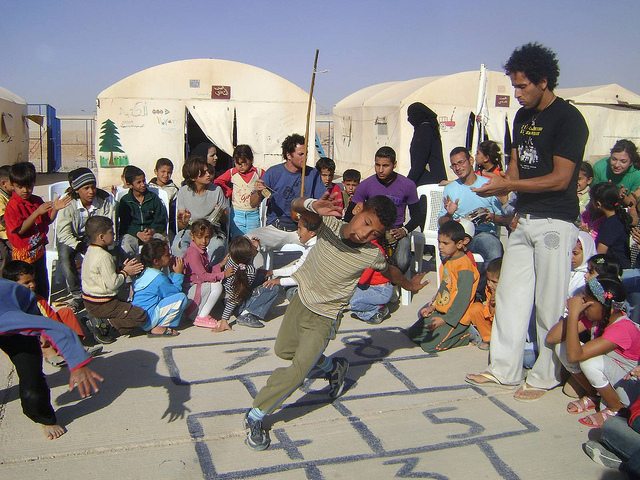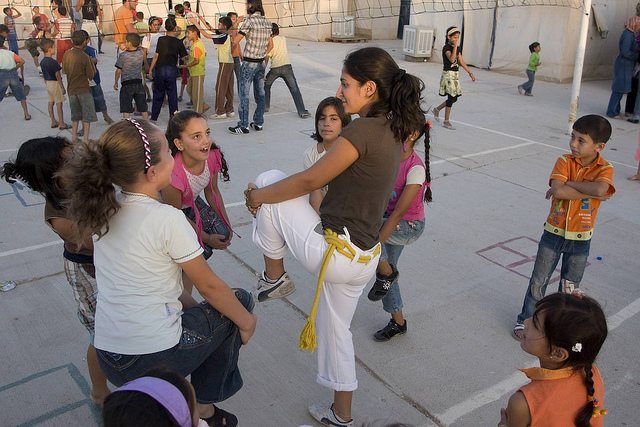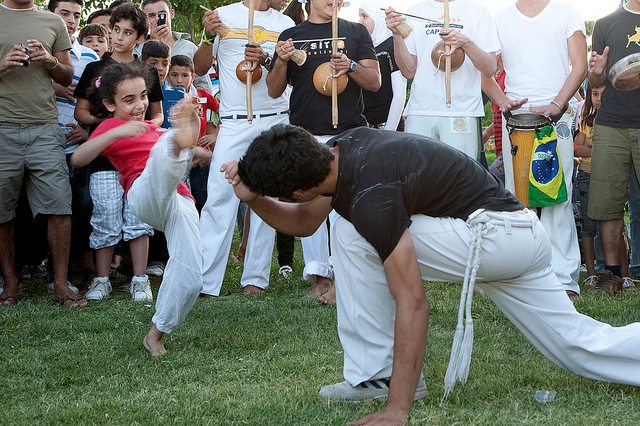It’s all in the game
Capoeira in Damascus

In true capoeira spirit, Damascus’ first and only group started in the streets. When Syrian-German Tarek Alsaleh decided to move to Damascus in 2007, he was ready to leave the cold German weather and pressure from work, but not the capoeira. He couldn’t find a group to play with, so he did like capoeira players always have done: he took to the streets. Soon, neighbourhood kids and friends got curious and joined him. The first capoeira group in Syria was born.
CapoeirArab, as the capoeristas call themselves, have been around for three and a half years now, and have moved from the streets to indoor facilities. “When the kids started coming regularly, we needed a training space for everyone,” says Tarek. “And girls wanted to play, but they wouldn’t do it outside where people could watch them.” This was back in 2007, when Tarek was the only teacher. Now, capoeira has firmly taken root in Damascus, with 12 Syrian trainers and volunteers who can teach beginners, and weekly classes for all levels.
Capoeira is a martial art originating from 16th century Brazil, where African slaves mixed different techniques of fighting with music, singing and acrobatics. The game, played in a circle, marked by kicks, dance moves and acrobatics, is accompanied with singing and music. Having been at the centre of Afro-Brazilian culture for hundreds of years, it is only during the last 50 years that capoeira started being exported abroad. Today, the practice is spread across the world, with people from all backgrounds and cultures attracted by its special mix of social, artistic and physical aspects.

Many practitioners are also drawn to capoeira’s philosophical foundations and communal spirit. In contrast to many other martial arts, capoeira has no winners and no losers. The game is not about beating or getting beaten; it’s about expressing playfulness and collaboration. This way, it fits well with community outreach and social initiatives, something that is at the core of CapoeirArab’s work. With a mission to engage Syrian youth regardless of their financial means, CapoeirArab has run a number of social projects since their start in 2007. They have worked with UNICEF, UNRWA and Caritas, and taught capoeira to more than 6,000 kids and youth across the country; Syrians as well as Palestinian, Iraqi and Somali refugees. “It works in these communities because it was born from a similar need: emancipation,” says Tarek. “To this day, capoeira remains a powerful tool for community integration, education and empowerment.”

He continues: “Currently, we are teaching around 300 children a week for free, in classes with representatives from at least 10 different nationalities.” CapoeirArab has also run projects at juvenile institutions and the (now closed) Al Tanf refugee camp on the Syrian-Iraqi border. They have worked with a women’s safe house and they have started classes for girls only. To Tarek, capoeira fits well in the Syrian context: “Capoeira is music, dance and play. This is something that comes naturally to people here. And often, when we’re singing in Arabic, even though we’re doing capoeira, people spontaneously start playing dabke.”
But CapoeirArab has also seen challenges. At the moment, the group is facing financial issues due to not being registered as an NGO. “It’s not a good situation,” says Tarek. “We are waiting for a new law that will enable us to register, but it keeps getting postponed. We would love to expand, but for that we need funding.” On a more positive note, a sister project inspired by CapoeirArab was founded last year: Bidna Capoeira, an international relief and development organisation registered in the UK. Working initially in the Middle East, Bidna Capoeira is looking to expand worldwide, following the concept that originated among oppressed slaves in 16th century Brazil. As for CapoeirArab in Syria, Tarek hopes for a financial solution that will enable them to keep up their work and stay true to their most significant achievement: “We have never charged a single lira from a child.”

16 thoughts on “It’s all in the game”
Leave a Reply
You must be logged in to post a comment.







I want to say thanks a lot for the work you have made in writing this blog post. I am hoping the same top work by you down the road also.
Bless you for finding the time to describe the terminlogy for the novices!
Just where is the facebook like button ?
Helaine: button fixed!
Após assistir um documentário sobre Al Tanfn e ficar emocionado, fiz pesquisa e encontrei brasileiros levando um abraço ao povo palestino.
Thanks for the posting of that article.
All World witness the positive change of 1000’s of Children through Capoeira. I t brings the community closer together. The combination of Music, Sport and Dance is very powerful and this lacking in this world. The children pull in there parents because there cruise what there do. Singing and encouraging each other, trying the moves, even to play a new instrument.
We are currently working in Palestine, please check out Bidna Capoeira on Facebook to follow up.
All the best!
This is an amazing story. I can so rteale to it. I started what I thought was the first Capoeira group in the Arab world in 2005 in Beirut. I was talking to a friend that I was training capoeira, so then he asked me to show me some. This turned in a small group of us, training wherever we could find spaces, parking lots, abandoned buildings, roof tops, empty streets at night the enthusiasm and energy of my students’ was amazing, we had no instruments, no place and were facing a lot of ignorance and often rejection. We had to make do with whatever we had. It was inspiring. I had to leave in 2006, but I think the group is still going in Hamra.Parabens for doing this amazing work and inspiring so many people. This is the true capoeira for me!!!!!!!!!Muito axeron (sabugo/carioca)